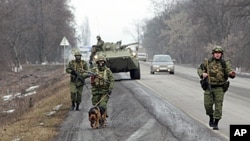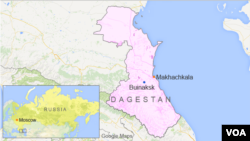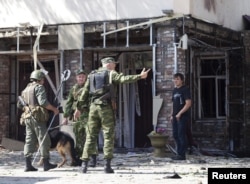The Russian government announced this week that three Islamic State-linked militants were arrested in Dagestan, one of the seven republics of Russia's North Caucasus region.
According to the National Anti-Terrorist Committee, the insurgents revealed the location of their safe house on the outskirts of a village, where authorities found four improvised explosive devices and nearly a ton of explosives.
The North Caucasus has experienced large-scale insurgency-related violence over the last two decades. Tens of thousands of people were killed in the 1994-1996 war between the Russian military and insurgents in Chechnya, and tens of thousands more died after Russian security forces intervened in Chechnya in 1999.
The second Chechen war never really ended. Instead, it evolved into a low-grade conflict after an iron-fisted pro-Moscow regime in Chechnya pushed the insurgency, which was now more Islamist than separatist, into neighboring North Caucasian republics, particularly Dagestan.
Attack in North Caucasus
According to Caucasian Knot, a Russian website that covers the region, last year saw the first claim of responsibility by Islamic State-linked militants for an attack in the North Caucasus. At the same time, the number of people killed in the conflict in the North Caucasus actually dropped by around one half — to 258 from 525 in 2014.
Some observers say that is at least in part because many militants from the North Caucasus went to fight in Syria. Earlier this week, after Russian President Vladimir Putin announced the withdrawal of Russian forces from Syria, Russian Defense Minister Sergei Shoigu said his troops in Syria had killed 2,000 militants from Russia, including 17 field commanders.
Caucasian Knot editor-in-chief Grigory Shvedov said he does not trust Shoigu's figures.
"I always treat with skepticism the figures with three zeros, regularly heard from very authoritative sources at various levels, of the number of dead [militants] in Syria, the number of Russian nationals now fighting in ISIS-controlled territory," Shvedov told VOA, using an acronym for Islamic State. "I don't trust this data."
Still, Shvedov said, "a very large number of people from the North Caucasus" did go to the Middle East to fight in the Islamic State ranks, including "ideological leaders" of the militants in the North Caucasus.
"So Russia became calmer," he said, adding, "it is clear that both the number of incidents and the number of dead and wounded in the North Caucasus have decreased."
At the time, Shvedov said, Islamic State militants set up an infrastructure and began operations in the North Caucasus.
"Unfortunately, I think, they are preparing some new special operations, and therefore require replenishment from among the people who fought in Syria and Iraq," he said.
Russia, Syria and Islamic State
Shvedov added that it is not clear what effect the winding down of Russia's military involvement in Syria will have on the Islamic State presence in the North Caucasus.
"Maybe, some of the militants now want to return home [to Russia]," he said. "But this is still a matter of conjecture."
Alexei Malashenko of the Carnegie Moscow Center told VOA that Russia's economic downturn makes the North Caucasus, already one of the poorest parts of the country, particularly vulnerable to Islamic State influence.
"If our economy continues in the same depressed state, this will sooner or later result in some sort of resistance, in some sort of protests," he said. "Unemployment in Dagestan, according to various estimates, ranges from 9 to 28 percent."
Given these grim indicators, Malashenko said, "fighters steeped in the ideology of Islamic State may be in demand tomorrow."






